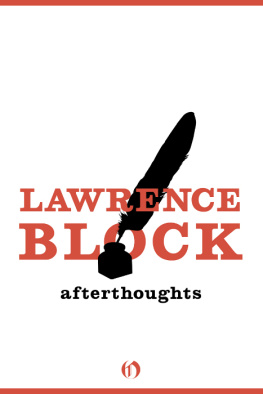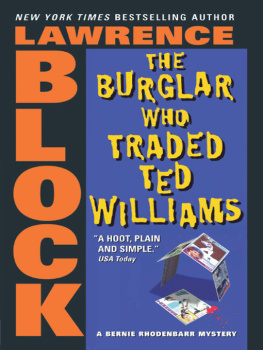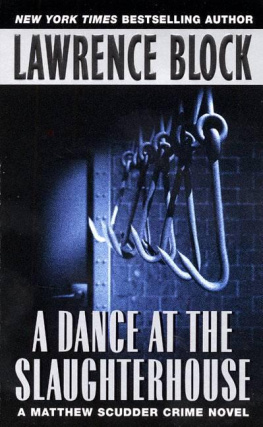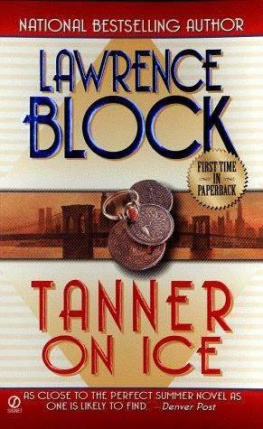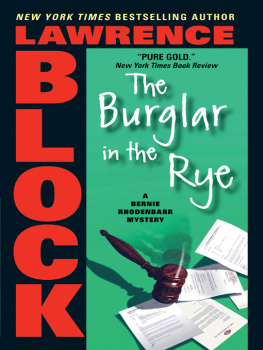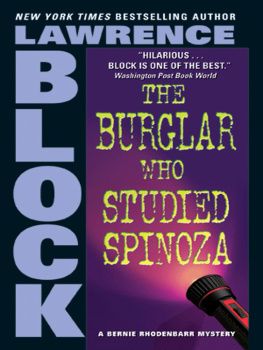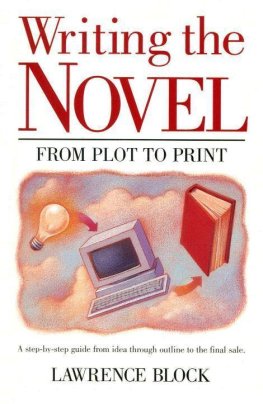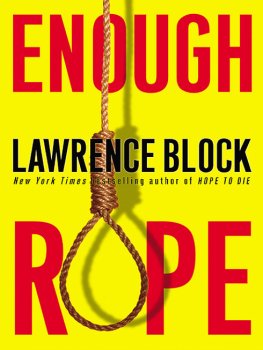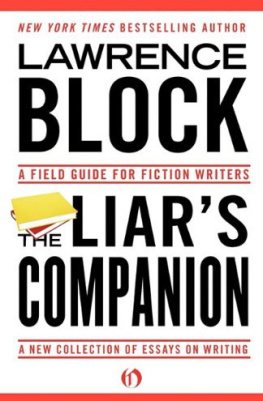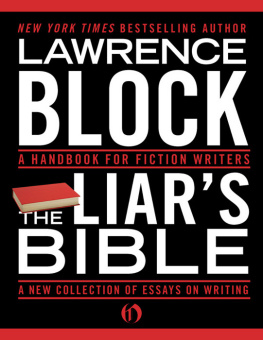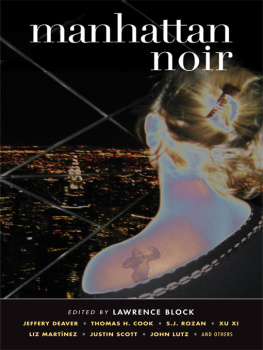
Afterthoughts
Lawrence Block

Introduction
Sometime in the mid-1990s, I was in residence at Ragdale, a writers colony in Lake Forest, Illinois. I had a six-week stay booked, and upon arrival I went straight to work on what would eventually become The Burglar in the Library. I worked hard for perhaps three weeks, and got quite a bit written, but pulled up short when I realized the book had taken a serious wrong turn and I wasnt ready to straighten it out.
Well, these things happen. I had the sense to put the book aside and work on other things. I wrote two stories about Keller that became chapters in Hit Man, and I wrote an introduction to a hardcover edition of The Canceled Czech. And then, with a week to go, I started work on a memoir.
I hadnt been thinking of this, at least not consciously. But what I decided was that Id write a book about my early years as a writer, and the words flew out of me. I found I would be writing about something I hadnt thought about in years, and it would lead me to incidents Id totally forgotten, as various doors in my memory flew open one after another. I worked all day every day, and by the end of the week Id produced 50,000 words.
Then I went home to New York, where I spent a month surrendering to physical, mental, and emotional exhaustion of a sort Id never felt before. I had, as best I could figure it, about forty percent of the book written, and my then-agent incorporated that book into a four-book contract with my then-publisher.
A few years later, I bought back the memoir. It was clear to me I was never going to finish it.
I dont know why. Maybe I just wasnt willing to risk that sort of exhaustion again.
I did write a memoir some years later. Step by Step: A Pedestrian Memoir began as a record of a year in the life of an aging and unskilled racewalker, and wound up including more material about my early years than Id anticipated. When Id finished it I found myself thinking about A Writer Prepares. (Thats what Id been calling the earlier memoir, with a nod to Stanislavskis An Actor Prepares.) But I didnt even go so far as to read what Id done earlier.
Then, in 2010, I began writing afterwords to early works I was readying for new lives as ebooks. It seemed to me this would be an easy way to add value to the new editions, and also to put them into perspective for todays reader. Looking back, I suspect there was more to it; I think I wanted to dip into the past, wanted indeed to write autobiographically about my early writing days. And, while I wasnt prepared to resume that memoir from fifteen years earlier, I could cover the same ground incrementally, a book at a time.
And thats what Ive done. If I have indeed written a memoir on the installment plan, why shouldnt I put all of those afterwords together into a single volume?
But how to organize the material? When all else fails, I tend to opt for alphabetical order, but thats no better than other notions that occurred to me. So Ive tried to group the books by type. But these pieces dont have to be read in any particular sequence. Youre certainly free to skip around.
Meanwhile, why shouldnt I add a few other introductions and afterwords written for other occasions? A few years ago I wrote introductions for new paperback editions of all eight Evan Tanner novels, so why not toss them in? The book can find room for them. Indeed, it can be readily expanded whenever circumstances warrant it. As I allow other old efforts to be made available again, and as I write new afterwords for each of them, my publishers can add the additional material to Afterthoughts. It will always be up to date, while never ceasing to be a work in progress.
Furthermore, because theres no getting around the fact that Afterthoughts is likely to lead some readers to sample other books of mine, Im able to think of it as a promotional vehicle for all my works. And this means that I can afford to price it very inexpensively indeed.
A lot of you have asked for a memoir about my writing career. This seems to be it. I do hope you enjoy it.
Lawrence Block
Greenwich Village
Lawrence Block () welcomes your email responses; he reads them all, and replies when he can.
Lawrence Block novels
After the First Death
In the summer of 1964, I moved from the Buffalo, New York, suburb of Tonawanda to Racine, Wisconsin, to take an editorial position in the coin supply division of Whitman Publishing Company, a division of Western Printing. I enjoyed my time in the corporate world, but a year and a half of it turned out to be enough, and in early 1966 my then-wife and I and our two daughters moved into a large, well-appointed house in New Brunswick, New Jersey. It was down the street from my agent, Henry Morrison, and a block away from Don Westlake, my best friend.
Id done some non-numismatic (currency-related) writing during my sojourn in Racine, completing the second Jill Emerson novel (Enough of Sorrow), a Gold Medal Books crime novel (The Girl with the Long Green Heart), and the first Evan Tanner adventure (The Thief Who Couldnt Sleep). In New Brunswick I installed my massive oak desk in a third-floor study and went right to work on a second Tanner book. I was freelancing full time again and glad to be back to it.
Once a week Id go to New York, generally getting a ride in from Henry. Id participate in a poker game that four or five of us had kicked off in 1960and that continues to this day, albeit monthly rather than weekly. And sometimes, after the game broke up, Id pursue other interests in and around Times Square, catching a train home the following afternoon.
Around this time a lot of criminals drew Get Out of Jail Free cards, courtesy of some Supreme Court decisions. Because their confessions had been improperly obtained, because theyd been denied counsel, because in one way or another their rights had been violated, they got to walk out and go homeat least until they got picked up for doing the same thing over again.
That was something to think about.
Around the same time, I was having the occasional blackout after the occasional long night of heavy drinking. I didnt get drunk every time I drank, nor did I have a blackout every time I got drunk, but once in a while Id come to with no recollection of having gone to bed. Sometimes Id have spotty memories of a couple of hours. Sometimes Id have no memory at all.
In time Id learn that blackouts are almost invariably a marker of alcoholism. While not all alcoholics experience them, anyone who does may be said, at the very least, to have something problematic about his drinking. I didnt know that then, and simply regarded blackouts as an unfortunate consequence of having had too much to drink. My blackouts generally consisted of an inability to recall a tedious hour or two at the end of an extended evening, when no one was likely to have said anything worth remembering in the first place. They were, I was fairly certain, something I could learn to avoid.
A fellow Id worked with a decade ago at the Scott Meredith Literary Agency, a merchant seaman-turned-writer named John Dobbin, told me how hed go on a toot on shore leave and wake up a couple of days later. In Cuba, he said, he came to in a bed with six prostitutes. I sort of envied him. Hey, nothing like that had ever happened to me.
Suppose a man woke up in a Times Square hotel with a splitting headache and no recollection of going there. Suppose he wasnt alone. Suppose there was a woman there, one hed never seen before.
Next page
